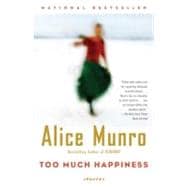Ten superb new stories by one of our most beloved and admired writers—the winner of the 2009 Man Booker International Prize.
With clarity and ease, Alice Munro once again renders complex, difficult events and emotions into stories about the unpredictable ways in which men and women accommodate and often transcend what happens in their lives.
In the first story a young wife and mother, suffering from the unbearable pain of losing her three children, gains solace from a most surprising source. In another, a young woman, in the aftermath of an unusual and humiliating seduction, reacts in a clever if less-than-admirable fashion. Other tales uncover the “deep-holes” in a marriage, the unsuspected cruelty of children, and, in the long title story, the yearnings of a nineteenth-century female mathematician.
“Richly detailed and dense with psychological observation. . . . Munro exhibits a remarkable gift for transforming the seemingly artless into art . . . She concentrates upon provincial, even backcountry lives, in tales of domestic tragicomedy that seem to open up, as if by magic, into wider, deeper, vaster dimensions.” —Joyce Carol Oates, New York Review of Books
“As always in her distinctive stories, Alice Munro’s style is vivid, her attention tireless, her curiosity omnivorous, and her sentences drawn from the freshest of springs.” —The Washington Post
“Few writers can match the clarity and immediacy of Munro’s descriptions whether she is portraying a subsiding marriage, a treacherous childhood, or the erotic and intellectual sojourn of a 19th century Russian mathematician.” — The Boston Globe
“More than virtually anyone else’s, Alice Munro’s stories unfold in surprising ways that nonetheless seem perfectly right. They are marvels of unhurried compression in which precision looks casual, in which everything is clearly in its place, though no one else might think to put it exactly thus.” —Minneapolis Star Tribune








